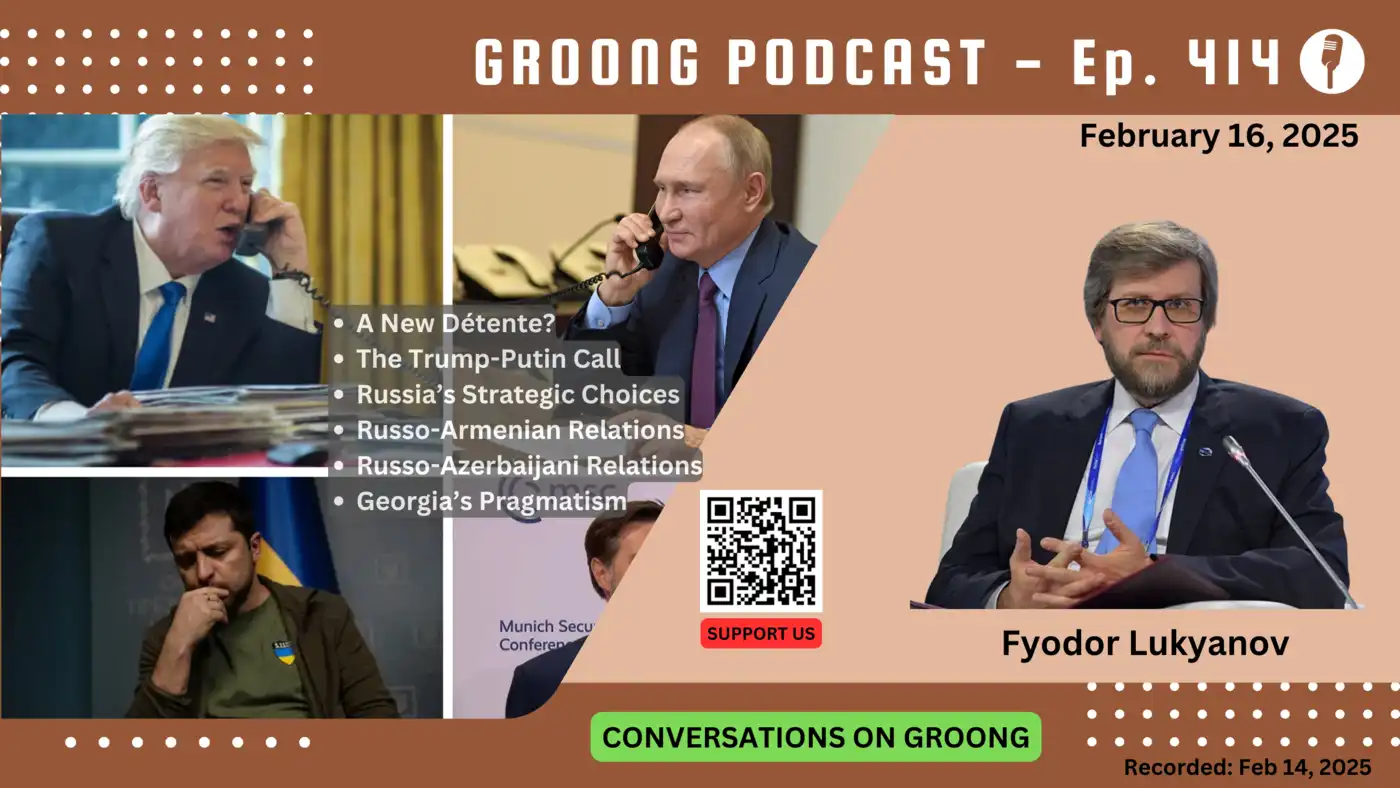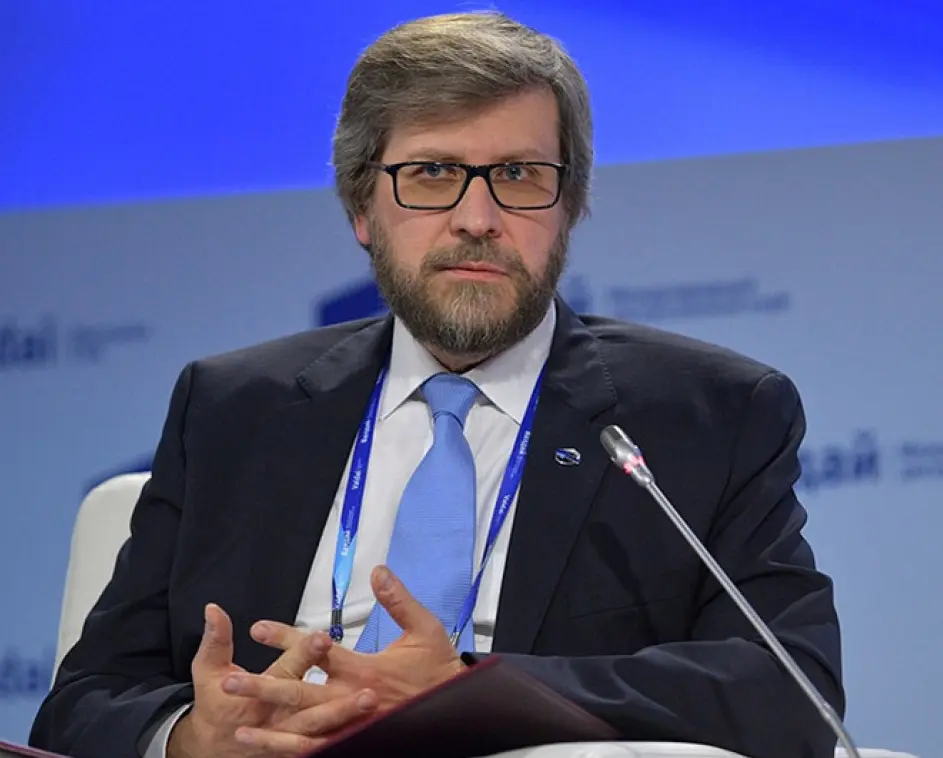
Groong Links:
Guest:
Topics:
- A New Détente?
- The Trump-Putin Call
- Russia’s Strategic Choices
- Russo-Armenian Relations
- Russo-Azerbaijani Relations
- Georgia’s Pragmatism
Episode 414 | Recorded: Valentine’s Day, February 14, 2025
Show Notes
Main Topics Addressed
A New Détente? Russia-US relations and evolving global dynamics
Do the recent shifts in US foreign policy, particularly under the Trump administration, indicate a move toward a new détente between Washington and Moscow? Lukyanov analyzed the broader geopolitical landscape, including US domestic politics, NATO’s role, and how different power centers perceive the idea of global stability.The Trump-Putin Call and its implications for Ukraine
During the highly anticipated Trump-Putin phone call key US policy positions on Ukraine were subtly adjusted. Trump’s remarks on Ukraine’s NATO prospects, the feasibility of a negotiated settlement, and whether Russia perceives this as a sincere effort toward peace or merely a political maneuver. Also, the possibility of sanctions relief and the role of European actors in any future negotiations.Russia’s Strategic Choices: BRICS, G8, and multipolarity
Russia’s strategic positioning in the global order. Trump has reportedly suggested that Russia should abandon BRICS and return to the G8, raising questions about Moscow’s long-term vision. Why Russia has moved toward a multipolar world vision and why it sees BRICS as a necessary vehicle for reducing Western financial influence, particularly in de-dollarization efforts.Russo-Armenian Relations and Armenia’s geopolitical shift The deteriorating relationship between Armenia and Russia under Nikol Pashinyan’s leadership. Discussion included Armenia’s push toward European integration, its potential exit from the Eurasian Economic Union (EAEU), and how Moscow perceives these developments. Is Armenia’s geopolitical realignment sustainable, and how Russia might respond to the changing dynamics in the South Caucasus?
The Zangezur Corridor and Azerbaijan’s regional ambitions One of the most pressing regional security concerns is Azerbaijan’s claim over Syunik, framed as the “Zangezur Corridor.” The discussion covered Baku’s military posturing, Turkey’s strategic backing, and Iran’s strong opposition, which it labels as “NATO’s Turan Corridor.” Lukyanov analyzed Russia’s position on the issue, whether Moscow views Syunik as a red line, and how this dispute fits into broader regional power struggles.
Georgia’s Pragmatism and its impact on Russia’s strategy
Georgia has adopted a notably pragmatic approach toward Russia, avoiding direct confrontation while resisting Western pressure. How does this contrast with with Armenia’s approach? What lessons should Yerevan take from Tbilisi’s strategy? And how does Russia view the possibility of renewed ties with Georgia? Lukyanov also provided thoughts on Georgia’s economic and security calculus in the region.
Key Questions Discussed
- Is Trump serious about ending the war in Ukraine, or is it just political maneuvering?
- What are Russia’s red lines in any peace settlement?
- Can the US and Russia reach a new détente?
- Will Russia abandon BRICS and rejoin the G8?
- How does Moscow view Pashinyan’s EU aspirations?
- What is Russia’s position on Azerbaijan’s ambitions over Syunik and the “Zangezur Corridor”?
- How does Georgia’s pragmatic approach shape its relations with Russia?
Referenced Articles & Sources
- Trump’s Truth Social Post on Meeting with Putin
- Trump’s Truth Social Post on Meeting with Zelensky
- Why Global Powers Can’t Agree on a New World Order
- UN Charter and Global Stability
- German FM on EU’s Role in Ukraine Talks
- Trump, Putin, and Ukraine Peace Talks
- Iran’s View on the “NATO-Turan Corridor”
- Trump Warns BRICS Nations of 100% Tariffs
- The Zangezur Corridor and Its Geopolitical Impact
Wrap-up
Don’t forget to support us:
That’s our show! We hope you found it useful. Please find us on Social Media and follow us everywhere you get your Armenian news.
Thanks to Laura Osborn for the music on our podcasts.
Guests

Fyodor Lukyanov
Fyodor Lukyanov is Chairman of the Council on Foreign and Defense Policy, a Russian think tank providing expertise in the foreign policy field. He is also editor-in-chief of Russia in Global Affairs, a platform for publication in English and Russian of research in political science and international relations. Mr. Lukyanov is also Director of Research at the Valdai Discussion Club.
Hosts

Hovik Manucharyan
Hovik Manucharyan is an information security engineer who moved from Seattle to Armenia in 2022. He co-founded the ANN/Groong podcast in 2020 and has been a contributor to Groong News since the late 1990s.
Disclaimer: The views expressed by Hovik Manucharyan on the ANN/Groong podcast are his own and do not necessarily reflect the opinions of his employer or any other organization.

Asbed Bedrossian
Asbed Bedrossian is an IT professional, and for years oversaw the central IT enterprise infrastructure and services at USC. His decades of experience spanned across IT strategy, enterprise architecture, infrastructure, cybersecurity, enterprise applications, data center operations, high performance computing, ITSM, ITPM, and more.
Asbed founded the Armenian News Network Groong circa 1989/1990, and co-founded the ANN/Groong podcast in 2020.